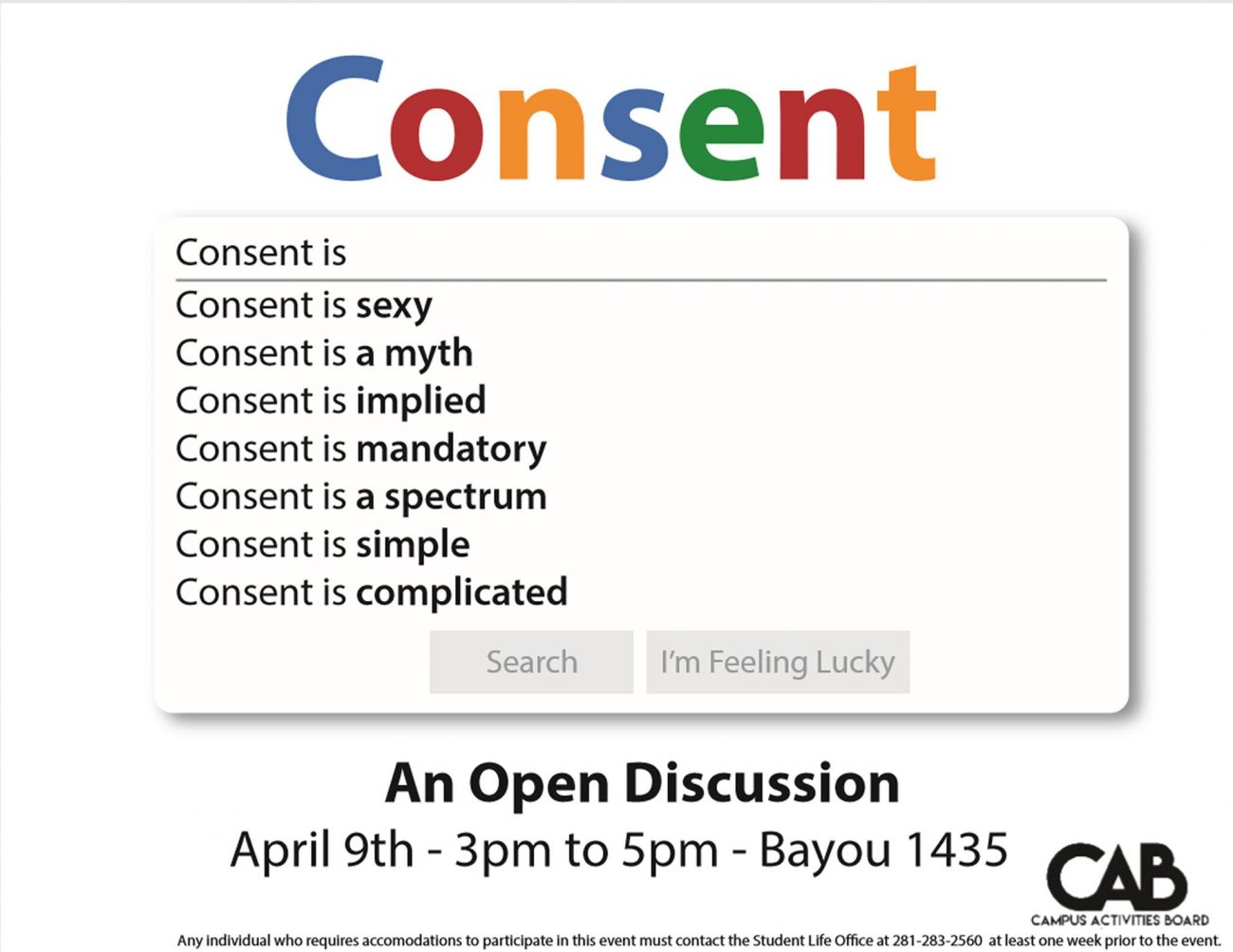CAB hosts open discussion about consent
No means no, plain and simple. Not, “maybe I’ll try harder next time” or “they are just saying no, but they really mean ‘yes.’” Consent is permission or agreeing to an arrangement made by all partners. “Consent: An Open Discussion” event was held at University of Houston-Clear Lake (UHCL) by the Campus Activities Board (CAB) on April 9, 2019.
The discussion was led by Aja Rodriguez, coordinator of the diversity programs in the office of student diversity, equity and inclusion. Rodriguez began by explaining that a topic such as this can be seen as uncomfortable for some to talk openly about. Shame, embarrassment and violence can be the outcomes of not knowing boundaries from consent.

The classroom was filled with about 10 participants and an activity was planned as an icebreaker in advance of the discussion. The activity was to sort strip cards with various situations printed on them from most comfortable to least comfortable and talk about why.
Some of the cards included things such as hugging, kissing, sharing phone plans, explicit material and non-explicit. The purpose of the activity was to help participants clearly understand what consent is, and that the issue of consent is complicated in many ways. Rodriguez explained that there are details to take into consideration and the best way to be able to understand consent is to start talking.
For college students, the climate of rape continues to escalate. A study from Rape, Abuse, and Incest National Network (RAINN) found, “11.2% of all students experience rape or sexual assault through physical force, violence, or incapacitation” and “women ages 18-24 are at an elevated risk.” There are often societal misconceptions that only females are targeted for sexual assault, when in fact, “5.4% of males” also experience these events.
In the open discussion participants, about one-fourth of which were male, addressed relatable topics in a safe place. Rather than lecturing about sex education, rape culture and sexual assault, the event brought a different and light approach to a serious topic. Students were encouraged to add their opinions and share if they chose. Some did share personal examples related to sexual assault or how they felt about assault on college campuses.
“Although it may be difficult, having discussions and talking out what something is can bring value to someone,” said a participant.
The conversation also touched on alcohol and college. In an article by Campus Safety Magazine, “At least 50% of college student sexual assaults are associated with alcohol use or sexual aggression than nonfraternity men.” The article also stated, “Students living in sorority houses and on-campus are 3 times and 1.4 times (respectively) more likely to be raped than students living off-campus”.
“Consent is not something that is just verbal,” Rodriguez said. “Consent is more of a conversation. It involves your values, knowledge, education level, timing and relation of person(s) that you’re with. You can’t give it when you’re intoxicated.”
The open discussion also looked at how consent is implemented on college campuses and how meetings and open discussions held on campus can create impact including examining how to accept and practice rejection. Rejection can bring shame and embarrassment to someone, but it is the responsibility of the parties to express their consent properly.
There are procedures put into place to make scenarios such as these stated above happen less or not at all. For example, UHCL’s sexual misconduct policy can be found at www.uh.edu/af/universityservices/policies/sa,/1GenAd/min/1D8.pdf. Students are explicitly made aware of the importance of sexual misconduct before being admitted to the university.
To report an assault of any kind, contact the campus police https://www.uhcl.edu/police/. Other resources that can be of help are: UHCL Dean of Students on sexual misconduct at https://www.uhcl.edu/dean-of-students/sexual-misconduct, UHCL Title 9 resources at https://www.uhcl.edu/policies/title-ix/resources or by calling 1-800-656-4673 for the National Sexual Assault Hotline.

